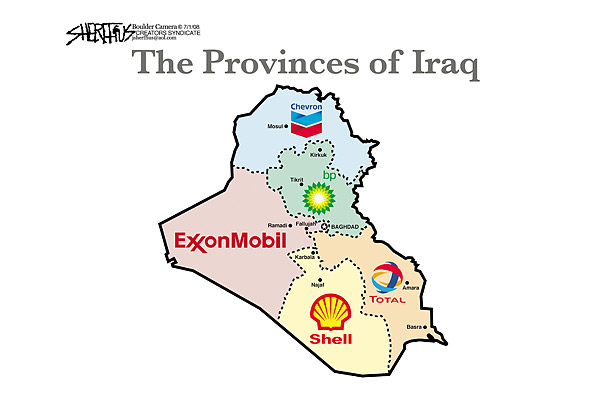Search
Democracy Links
Member's Off-site Blogs
real terrorist armies .....

from antony loewenstein …..
Obama’s advisers explained to reporters that Erbil holds an American consulate, and that “thousands” of Americans live there. The city has to be defended, they continued, lest ISIS overrun it and threaten American lives. Fair enough, but why are thousands of Americans in Erbil these days? It is not to take in clean mountain air.
ExxonMobil and Chevron are among the many oil and gas firms large and small drilling in Kurdistan under contracts that compensate the companies for their political risk-taking with unusually favorable terms. (Chevron said last week that it is pulling some expatriates out of Kurdistan; ExxonMobil declined to comment.) With those oil giants have come the usual contractors, the oilfield service companies, the accountants, the construction firms, the trucking firms, and, at the bottom of the economic chain, diverse entrepreneurs digging for a score.
Scroll the online roster of Erbil’s Chamber of Commerce for the askew poetry of a boom town’s small businesses: Dream Kitchen, Live Dream, Pure Gold, Events Gala, Emotion, and where I, personally, might consider a last meal if trapped in an ISIS onslaught, “Famous Cheeses Teak.”
It’s not about oil. After you’ve written that on the blackboard five hundred times, watch Rachel Maddow’s documentary “Why We Did It” for a highly sophisticated yet pointed journalistic take on how the world oil economy has figured from the start as a silent partner in the Iraq fiasco.
Of course, it is President Obama’s duty to defend American lives and interests, in Erbil and elsewhere, oil or no. Rather than an evacuation of citizens, however, he has ordered a months-long aerial campaign to defend Kurdistan’s status quo, on the grounds, presumably, that it is essential to a unified Iraq capable of isolating ISIS. Yet the status quo in Kurdistan also includes oil production by international firms, as it might be candid to mention. In any event, the defense of Kurdistan that Obama has ordered should work, if the Kurdish peshmerga can be rallied and strengthened on the ground after an alarming retreat last week.
Yet there is a fault line in Obama’s logic about Erbil. The President made clear last week that he still believes that a durable government of national unity - comprising responsible leaders of Iraq’s Shiite majority, Kurds, and Sunnis who are opposed to ISIS - can be formed in Baghdad, even if it takes many more weeks beyond the three months of squabbling that have already passed since the country’s most recent parliamentary vote.
The project of a unified Baghdad government strong enough to defeat ISISwith a nationalist Army and then peel off Sunni loyalists looks increasingly like a pipe dream; it was hard to tell from the Friedman interview what odds Obama truly gives the undertaking.
Why has political unity in Baghdad proven so elusive for so long? There aremany important reasons - the disastrous American decision to disband the Iraqi Army, in 2003, and to endorse harsh de-Baathification, which created alienation among Sunnis that has never been rectified; growing sectarian hatred between Shiites and Sunnis; the infection of disaffected Sunnis with Al Qaeda’s philosophy and with cash and soft power from the Persian Gulf; interference by Iran; the awkwardness of Iraq’s post-colonial borders, and poor leadership in Baghdad, particularly under Prime Minister Nouri al-Maliki. But another reason of the first rank is Kurdish oil greed.
During the Bush Administration, adventurers like Dallas-headquartered Hunt Oil paved the way for ExxonMobil, which cut a deal in Erbil in 2011. Bush and his advisers could not bring themselves to force American oil companies such as Hunt to divest from Kurdistan or to sanction non-American investors. They allowed the wildcatters to do as they pleased while insisting that Erbil’s politicians negotiate oil-revenue sharing and political unity with Baghdad. Erbil’s rulers never quite saw the point of a final compromise with Baghdad’s Shiite politicians—as each year passed, the Kurds got richer on their own terms, they attracted more credible and deep-pocketed oil companies as partners, and they looked more and more like they led a de-facto state. The Obama Administration has done nothing to reverse that trend.
And so, in Erbil, in the weeks to come, American pilots will defend from the air a capital whose growing independence and wealth has loosened Iraq’s seams, even while, in Baghdad, American diplomats will persist quixotically in an effort to stitch that same country together to confront ISIS.
Obama’s defense of Erbil is effectively the defense of an undeclared Kurdish oil state whose sources of geopolitical appeal - as a long-term, non-Russian supplier of oil and gas to Europe, for example - are best not spoken of in polite or naïve company, as Al Swearengen would well understand. Life, Swearengen once pointed out, is often made up of “one vile task after another.” So is American policy in Iraq.
- By John Richardson at 12 Aug 2014 - 4:34pm
- John Richardson's blog
- Login or register to post comments
Recent comments
22 min 47 sec ago
2 hours 17 min ago
3 hours 4 min ago
18 hours 23 min ago
18 hours 29 min ago
19 hours 31 min ago
1 day 1 min ago
1 day 1 hour ago
1 day 1 hour ago
1 day 2 hours ago